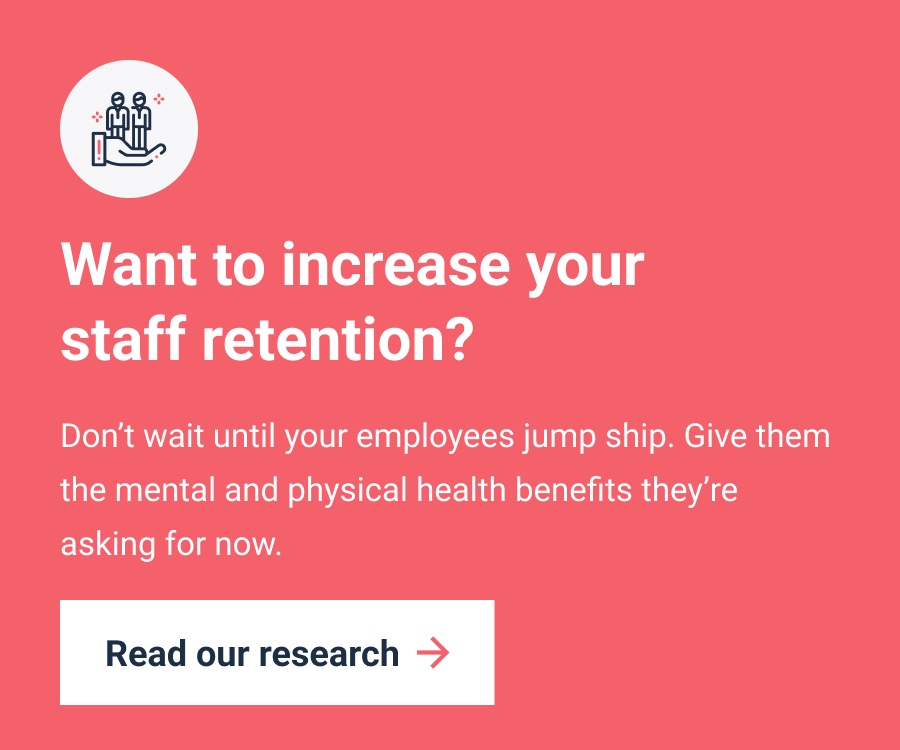- A recent survey by BUPA and the CIPD found that 900,000 women in the UK have left their jobs because of symptoms disrupting their working lives
- Many said that employers do not offer policies that support them through menopause – influencing their decision to leave their jobs
- The menopause is cited as having the second biggest impact on women’s careers, only just behind having children
- Our digital platform can provide easy access to practising NHS GPs and mental health support to reduce absenteeism risk and job loss
Understanding the impact of menopause at work
Women make up nearly half of the UK workforce, but three in five experiencing menopause were negatively affected at work due to the severity of symptoms such as hot flushes, night sweats, anxiety attacks or brain fog, according to research carried out by the CIPD, the professional body for HR and people development. Menopause is a natural transitional point in every woman’s life – not a step backwards in employment potential or professional capability.
Yet a quarter of women experiencing debilitating symptoms are unhappy in their jobs because of inadequate support, with 63% saying that their place of work has not introduced any policies to make things easier for them.
The findings come from a poll of 2,000 women experiencing menopause symptoms across the UK, commissioned by Koru Kids. Researchers also warn that more than 1 million women in the UK could leave their jobs this year because employers have failed to support them.
Unsurprisingly, the main barriers to workplace support include not feeling comfortable talking about menopause and employers not knowing how to help. Nearly three-quarters of women surveyed said their workplace lacked a forum or space where they could speak openly about menopause with their colleagues or employers, exasperating their isolation and distress. Moreover, management can fail to grasp how women’s symptoms can differ.

How to support the menopause at work
Menopausal women are the fastest-growing demographic in the workforce, so managers and colleagues must have a clear understanding of how they can support them.
According to the Menopause and Workplace survey by the House of Commons, think about providing:
- Adjustments – listen to what the individual needs and make adjustments accordingly. Practical adjustments would help including: desktop fans, better ventilation, breathable uniforms suitable for menopause, access to drinking water and easy access to toilets and to washing facilities
- Policies – have a policy outlining what the company will do and where women are struggling can get advice both internally and externally. Sickness policies were frequently mentioned, with respondents asking that absence policies not penalise those needing time off to deal with symptoms, or for GP appointments
- Flexibility – offer flexibility in working hours along with working from home
- Education – Respondents also reported that their colleagues were embarrassed to discuss menopause and symptoms. Therefore, encourage a greater understanding of menopause and its impact in the workplace, including management training.
- Supportive cultural changes – a repeated issue in the survey was a desire to move away from menopause being joked about in workplace ‘banter’. Many said they wanted to feel safe discussing menopause with their managers and colleagues. Providing an ‘open space’ for women to talk about what they are going through will help others to become more willing to listen to the those living with menopause. Some respondents were worried that the introduction of workplace support could have the unintended effect of further stigmatising women. Another key takeaway was that staff want to feel ‘trusted’ to do their work alongside menopause, without the anxiety of being disciplined or facing other negative consequences for being open about menopause or having to take time off
- Support network – making menopausal women feel supported in the workplace and advising them how to access that support will help provide a safe place for them to discuss or seek support or advice for what they are experiencing. For example, respondents emphasised being able to speak to female colleagues while others wanted to talk with their managers, and sought the support of specialist doctors
Encourage open discussions, it shouldn’t be something people are afraid of talking about.
Apart from the House of Commons, many other organisations are already leading the way by following best practices and seeing the benefits. Mayor of London, Sadiq Khan introduced ‘menopause leave’ for staff at London’s City Hall. This ground-breaking policy encourages managers to engage actively with one of the last taboos of occupational health. Taking similar steps helps normalise workplace discussion and remove the stigma.
At HealthHero, we believe that the right menopause support can make all the difference to a woman’s happiness and productivity at work. Our remote GP service is an ideal solution. Fast and convenient access to practising GPs has the dual benefit of providing direct support and advice as well as reducing absenteeism risks and job losses by providing early intervention. Employees can speak to GPs over the phone or via video consultation regardless of where they live. Those experiencing mental health symptoms relating to menopause can access online clinically proven counselling and psychological interventions. Therefore, employees don’t need to take time off work to wait for mental health or GP advice.

Why it pays to invest in menopause support
Working life can return to normal quickly for women when they understand their symptoms and how to manage them. It’s a win-win situation for employers to provide meaningful support through the menopause transition. Those supported will remain in the workplace and achieve their full potential. They will thank you for it, and you will benefit from retention, motivation and loyalty.
Investing in immediate support can also safeguard you from long-term issues such as:
Legal disputes
Menopause is covered under the Equality Act 2010 on the grounds of sex, age or disability discrimination. Taking steps to provide support can help protect from legal entanglements.
Workplace costs
Since the investment in support is relatively low, the payback would be immediate when considering savings on recruitment costs, absence costs, and employee relations issues.
Sign up to our free menopause webinar
Are you a manager looking to help your employees experiencing menopause? Our webinar with expert guest speakers Dr Emma Southworth and Dr Natalie Summerhill will help you build a plan for building awareness, equip you with tools for delivering meaningful support and provide advice and guidance to keep employees working.
Speak to us today to discover more about how our service can help your workforce.





%20(1)-1.jpg?width=800&height=450&name=christina-wocintechchat-com-YCrgxs3e9lY-unsplash%20(1)%20(1)-1.jpg)